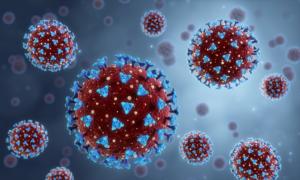A new COVID-19 virus variant, dubbed HV.1, has overtaken EG.5 (Eris) as the leading variant diagnosed in the United States, according to the U.S. Centers for Disease Control and Prevention’s (CDC) latest Oct. 28 report.
Since the newest COVID booster rolled out—which was designed based on the XBB.1.5 variant—there have been two major variants that have replaced XBB.1.5 as the dominant strain in the United States. We will discuss the battle between vaccines and COVID variants in the next article.

HV.1 Spreads Faster
HV.1 comes after EG.5, a grandchild of XBB.1.5, or the Kraken. Due to its fast transmission rate and superior ability to evade immunity thanks to its F456L mutation, EG.5’s global prevalence increased, prompting the World Health Organization (WHO) to categorize it as a “variant of concern” (VOC) in early August.HV.1 More Easily Evades Vaccines
HV.1 can further render the current COVID-19 vaccines ineffective, as it is even better able to escape vaccine-induced immunity than EG.5. This means none of the current COVID vaccines can induce any effective antibodies to bind HV.1.This results from the variant’s key mutations F456L, L452R, F157L, and Q52H. These latest mutations indicate that the new omicron variants have developed cunning strategies to evade our manmade vaccines by explicitly targeting specific sites. By doing so, they may be able to partially or wholly escape the protective effects of vaccination, potentially leading to breakthrough infections among the vaccinated.
The virus’ faster transmissibility and improved evasiveness help explain the rising curve we observe in the CDC report.
The Virus Changes Rapidly
Since 2022, the omicron sublineages have found new ways to evade our immune responses, enhance transmissibility, and achieve more reinfections.Why? A virus is an intelligent organism, always striving to survive. To achieve its objective, it has no option but to evolve and outpace mankind’s development of new vaccines.
Will HV.1 Cause More Severe Symptoms?
According to current data, HV.1 will likely cause the same symptoms associated with an omicron infection, such as:- Cough.
- Fatigue.
- Congestion.
- Runny nose.
Taking vitamins D and C and trace minerals, maintaining a peaceful and optimistic attitude, and avoiding stress, anxiety, and depression will all benefit our immunity.
When exposed to the same virus, the outcome for those with stronger antiviral immunity will be different than for those with weaker immunity. To win the battle with the virus, we must choose the time-tested strategy of fostering our immunity.







